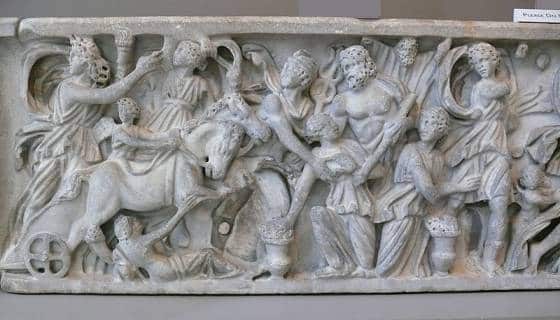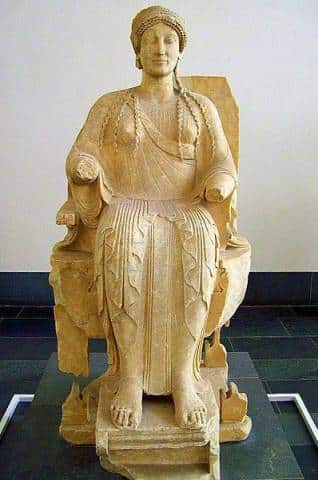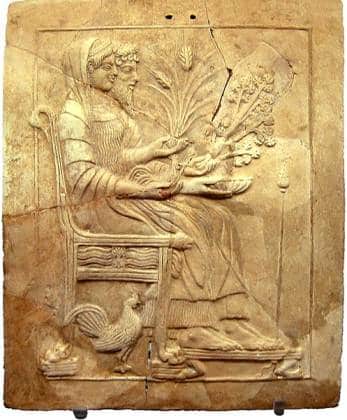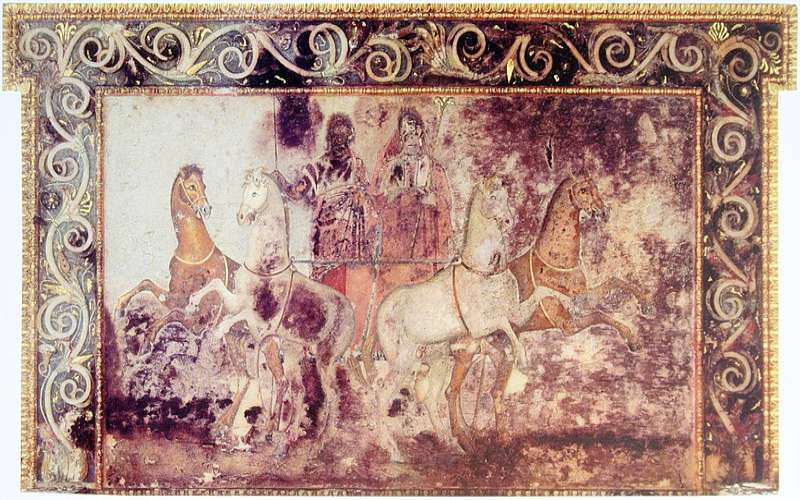Persephone, a Greek goddess known in her childhood by the name Kore (or Cora, meaning young maiden), was the only child of the union of Demeter, the Goddess of the bountiful harvest, and Zeus, the mighty king of the Olympians. Persephone was born during the time that Demeter was Zeus’ consort, long before his marriage to the Queen of the Olympians, goddess Hera.
By all accounts, Persephone had an idyllic childhood, being raised by her nurturing mother and playing with her father’s other daughters, the Greek goddesses Athena and Aphrodite. Always a cheerful and compliant child, the little goddess Persephone was a parent’s dream.
Persephone’s Charm Attracts An Unusual Suitor

According to Greek mythology, Persephone’s life was soon to change. As signs of womanly beauty began to shine through her childlike innocence, the adolescent goddess Persephone unwittingly attracted the attention of the Greek god Hades, brother of Zeus and ruler of the Underworld.
One can hardly blame Hades because the Underworld, in Greek mythology, was the realm of the sleeping and the dead. It surely needed some “brightening up,” and the young goddess Persephone’s radiance would definitely liven up the place.
The god Hades, however, did not bother to woo the young Persephone and win her heart and approval. After asking for and receiving, her father’s approval for Persephone’s hand in marriage, Hades simply abducted her one bright sunny day.
The Abduction
When she stooped to pluck a narcissus from a field of wildflowers near her home, the meadow was suddenly torn open, and Hades simply reached up from the Underworld and snatched Persephone away, taking her to his Underworld kingdom and making her his queen.
Although the young goddess did grow to love Hades, she remained homesick for her mother and the life she’d known on earth.
Demeter’s Protest
Her mother, the goddess Demeter, had heard Persephone’s screams when Hades grabbed her and began an intensive search for her daughter. After learning how Zeus had betrayed their daughter, Demeter, consumed by grief and sorrow, demonstrated her outrage by withholding her blessing from the earth until Persephone was returned to her.
Droughts ensued, and the earth lay barren. Mankind suffered as the unprecedented famine continued. Zeus finally relented and sent the god Hermes to bring the young goddess Persephone back to her mother.
Persephone’s Decision
Part of Persephone missed her mother terribly, but another part of her had grown rather fond of the god Hades, and she was really enjoying her role as Queen, even if it was in the Underworld. While preparing to return to the earth with Hermes, Persephone accepted a pomegranate offered to her by Hades.
She knew full well that anyone who had eaten while in the Underworld would not be allowed to return to the world above, even a goddess, yet Persephone went ahead and ate six or seven of the seeds.
The Agreement
She was soon reunited joyfully with her mother, but her choice to eat the seeds prevented her from ever being fully restored to Demeter. Still, it did open up the possibility of a compromise.
Hermes was able to negotiate an agreement on her behalf between Hades, a god who was usually rather cold-natured and self-centered, and Demeter because they both were invested in Persephone’s happiness.
Persephone would be allowed to stay with Hades in the Underworld for four months each year during the winter months (some versions say it was 5 or 6 months, Autumn and Winter), and then she would return to the earth with her mother the remaining months of Spring and Summer.
Each year as Persephone left to join her husband in the Underworld, Greek mythology tells us that the goddess Demeter would begin to grieve, bringing on the cold and barren winters. But a few months later, Persephone, the goddess associated with awakening, would return to bring spring and its verdant growth in her wake… thus were the seasons established.
The Queen of The Underworld

In no way did the goddess Persephone neglect any of her responsibilities as the Queen of the Underworld. Persephone was much more than a Mama’s girl. Having decided to consume the seeds of the pomegranate while in the Underworld, Persephone was able to somehow always return to the Underworld when others came visiting, ready to receive them and to serve as their hostess and guide.
Helping Other Gods and Deities
The goddess Persephone, Queen of the Underworld, was willing to help the goddess Psyche pass a test set by Aphrodite, the Greek Goddess of Love, so that Psyche could be reunited with her beloved husband.
Psyche had been assigned to go to the Underworld and return with some of Persephone’s famous youth and beauty ointment. It was actually a sleeping potion, but hey, we all know what a bad night’s sleep can do to our appearance! While Psyche was in the Underworld, she found Persephone to be both a gracious and generous hostess.
The Greek goddess Persephone also helped Heracles (Hercules) by loaning him Cerberus, the ferocious three-headed dog that guarded the entrance of the Underworld, so that he could complete the Twelve Labors he’d been assigned as recompense for the death of his wife. The goddess Persephone was also at home in the Underworld when Odysseus (Ulysses) arrived. She rewarded him with a legendary tour of the souls of women of great renown.
Feud With Aphrodite
In another intriguing story, Persephone agrees as a favor to Aphrodite to hide Adonis, one of Aphrodite’s mortal lovers, from Aphrodite’s jealous husband, Hephaestus, the Greek God of Fire and Metalworking.
Upon seeing the beautiful Adonis, Persephone, the receptive goddess that she was, also fell for his charms and refused to give him back to Aphrodite. Remember, these Greek goddesses were the original “wild women,” refusing to yield to the convention!
Eventually, Zeus had to step in to settle the argument. He ruled that Adonis should spend a third of the year with Persephone and a third with Aphrodite, then be left to his own pursuits for the remainder of the year. Unfortunately, Adonis chose to spend his free time hunting and was killed in a hunting accident a few years later.
Legacy
The Greek goddess Persephone represents both the youthful, innocent, and joyous maiden aspect of a woman as well as the more womanly self who, when innocence is lost, and family attachments are loosened, can begin to consciously mature and create a life for herself.
In Greek mythology, Persephone, the Queen of the Underworld, is the possessor of its dark and frightening wisdom. But Persephone is also the Goddess of Innocence and Receptivity, the harbinger of spring, and a reminder of all the growth and hope that it brings.
Some attribute Persephone, along with the Egyptian goddess Isis, with being the inspiration for the High Priestess card of the Major Arcana in tarot.
Persephone Symbols
Persephone (also known in her youth as Kore and the Roman goddess Prosperina) is often represented by symbols associated with the coming of spring. It is not surprising that many of our icons representing the mysteries of rebirth are derived from the ancient goddess symbols of Persephone.
General
Spring is the time of the year when nature awakens from the deep winter slumber. It is also the time when Persephone leaves the Underworld to spend several months with her mother, Demeter. Demeter is so happy to see her daughter again that nature rejoices with her.
Other general symbols of Persephone include a wreath of flowers worn in hair, a torch, reeds, waterfalls, rivers, and springs.
Animals
Bat is one of the animals symbolizing Persephone and her role od the Queen of the Underworld. Bats symbolize death and rebirth, and they also symbolize Persephone’s descent into the Underworld and her return.
Other animals that symbolize Perspephone are rams, monkeys, parrots, and all talking birds.
Plants
One of the most famous Persephone symbols is the pomegranate. Pomegranate seeds were offered to Persephone by Hades when she was going back to her mother. By eating them, Persephone became permanently tied to Hades and the Underworld.
As such, pomegranate fruits and seeds symbolize marriage, fertility, and abundance. Other plant symbols of Persephone are narcissus, willow tree, lily, ivy, lily of the valley, oriental lily, maidenhair fern, daisy, and lavender.
Perfumes/Scents
Since Persephone is closely connected to the arrival of spring, it makes no wonder that floral scents and perfumes (usually narcissus and hyacinth) perfectly capture her essence as a goddess.
Other scents and perfumes that represent Persephone are almond, vanilla, and bergamot.
Gems and Metals
Garnet is a gemstone commonly associated with Persephone. Due to its rich red color, this gemstone was named after a pomegranate fruit, another symbol of Persephone.
Other gems and metals that symbolize Persephone are pink tourmaline, sapphire, obsidian, agate, and jasper.
Goddess Jewelry
There are many reasons why you might want to keep a healing crystal or stone close to you. Getting closer to your goddess by wearing her color or crystal is a great one. That they also look great as jewelry only makes it so much better!
Here is a guide to crystal jewelry you hopefully will find helpful. In it is a list of 30+ crystals and links to some really great looking jewelry with that crystal or stone. Enjoy!
Colors
Green, gold and red are colors associated with Persephone. Other colors symbolizing Persephone are black, light blue, purple, magenta, indigo, and yellow.
Embracing the Call of Persephone: Recognizing Her Presence and Cultivating a Sacred Connection
Have you ever felt a deep connection with the changing seasons, especially the transition from winter to spring? For many spiritual seekers, the goddess Persephone may be extending an invitation to connect. Explore how to recognize the signs of her calling, invoke her presence, and cultivate a meaningful relationship with this enigmatic Greek goddess.
How to know if Persephone is calling you?
One way to recognize Persephone’s call is through the changing seasons. Encounters with blooming flowers, budding trees, or feelings of renewal during the shift from winter to spring may be signs. Keep an eye out for any plants or seasonal changes that seem significant, as Persephone often communicates through these elements.
Dreams and visions are another way Persephone may reach out. Dreams featuring her or her symbols, like pomegranate seeds or the underworld, can be significant. Similarly, visions of lush gardens or dark, hidden realms might signal her presence.
Finally, pay attention to synchronicities in your life. Repeated encounters with her symbols, or a strong attraction to her stories and mythology, can indicate that Persephone is calling you. These patterns may seem coincidental, but they’re worth noting.
Invoking Persephone
To call upon Persephone, start by selecting a location that represents the transition between seasons or create an indoor space inspired by nature. Incorporate her symbols, such as pomegranate seeds, flowers, or images of her into your chosen area. This will help establish a connection with the goddess.
During your ritual, light candles, particularly green or red, as they represent the earth and her journey between worlds. Offer symbols of Persephone, such as flowers, seeds, or even written intentions. These offerings demonstrate your dedication and respect for her.
In meditation, focus on your breath and clear your mind. Visualize Persephone, her symbols, and the energy she embodies. Quietly ask for her guidance, and be open to any insights that may arise during your meditation.
Signs that Persephone is present
Recognizing when Persephone is with you is essential to deepening your connection with her. The goddess often manifests her presence in various ways, from emotional sensations to visual cues. Here are six signs to help you identify when Persephone is near:
- Emotional sensations: Feelings of renewal, transformation, or personal growth can indicate her presence.
- Physical reactions: Sudden warmth, tingling sensations, or goosebumps may signal she’s near.
- Visual cues: Flashes of green light, shadows moving, or glimpses of her symbols can be signs.
- Auditory cues: Hearing whispers, rustling leaves, or the sounds of nature may suggest her presence.
- Nature occurrences: Unusual plant growth or blossoming, especially during seasonal transitions, can be a signal.
- Intuitive connection: A strong sense that Persephone is with you, even if you can’t pinpoint why, can be a sign of her presence.
Cultivating a Relationship with Persephone
To develop a deeper connection with Persephone, establish a consistent practice of meditation, prayer, or ritual to honor her. Make regular offerings, such as during the change of seasons, to demonstrate your commitment to the goddess.
Embrace her values by appreciating the balance between life and death, growth and renewal in your life. Protect and nurture nature and its cycles, as these aspects are central to her being. Aligning your life with her principles will help deepen your connection to her.
Lastly, study her mythology and history. Read about Persephone and her place in Greek mythology, and engage with others who share your interest. By exchanging insights and experiences, you’ll develop a richer understanding of the goddess and strengthen your bond with her.
Meditations To Invoke The Goddess Persephone
- Persephone, help me give full attention to the moment I am in so that I do not miss opportunities that come my way.
- Persephone, teach me not to be too critical of myself when I seem to lack initiative and discipline.
- Support me, Persephone, so that I can be more supportive, good-natured, and receptive to others.
- Great goddess, remind me that my value does not depend solely on compromising just to please other people.
- Persephone, help me to accept others as they are.
- Goddess, let me be a loving and forgiving person.
- Today is my chance to be healthy and happy.
- Great goddess, I give myself credit for knowing what is best for me.
- Persephone, lend me your ability to experience joy in life, greeting each day, knowing that my life is full of wonderful surprises.
- Persephone, teach me how to trust my intuition and follow my own path.
- Help me remember that the times of greatest sorrow also lead to the moments of greatest growth.
- Lend me your ability to sense an invisible spirit present in the world and stay connected to my past while my life undergoes changes.
- Persephone, teach me to approach new situations without fear and to welcome challenges that I can manage with success.
- Help me to have the courage to go after what I really want and need, even if it means that I can’t please everyone who cares about me.
- Persephone, grant me the ability to relax and have a good time.
- Goddess, like you, I accept responsibility for my happiness and for meeting my own needs.
- Persephone, share with me your heightened awareness of sensations and beauty and the ability to focus on living in the moment.
Want To Bring More Persephone Qualities Into Your Life?

- Slow down and, like Persephone, take time to smell the flowers. Make it a point to watch a sunrise occasionally, even if it means losing a few minutes of sleep. Experience the world with a great big “WOW”!
- Persephone blossomed from a naive and innocent young child into a self-confident queen almost overnight. Find a picture of yourself as a young child. Place it in a lovely frame and set it out where you can see it and admire how vulnerable and innocent you look.
- Think about your past. What were the things you did that were heroic? What caused you embarrassment or pain? Write them down and review them frequently, releasing any negative judgments that you formed against yourself.
- Persephone, as Queen of the Underworld, was renowned as a gracious and welcoming hostess. Practice really giving your full attention to someone else, listening to them with both your heart and mind.
- Move toward letting go of old resentment. Forgive, or at least accept with understanding, someone who you feel betrayed you.
- Work on trusting that it is safe to express your feelings, even if it means risking rejection. Reach out and let others know how you feel about them.
- Keep fresh flowers at home and in your office. Go to the park and play on the swings. Whistle while you work. To summarize, develop a free spirit and enjoy the spontaneous pleasures that are so freely available in this life.
- Surround yourself with Persephone’s symbols. Dress in her colors, and luxuriate in her youthful energy. Carry a quartz crystal and spray the scent of lavender on all your linens!
Other Goddesses
If you enjoyed this post we are sure you will enjoy getting to know some of the other goddesses we also write about. You can find the complete list of goddesses sorted across regions and religions here.
Featured Image Credit: Via Wikimedia Commons


